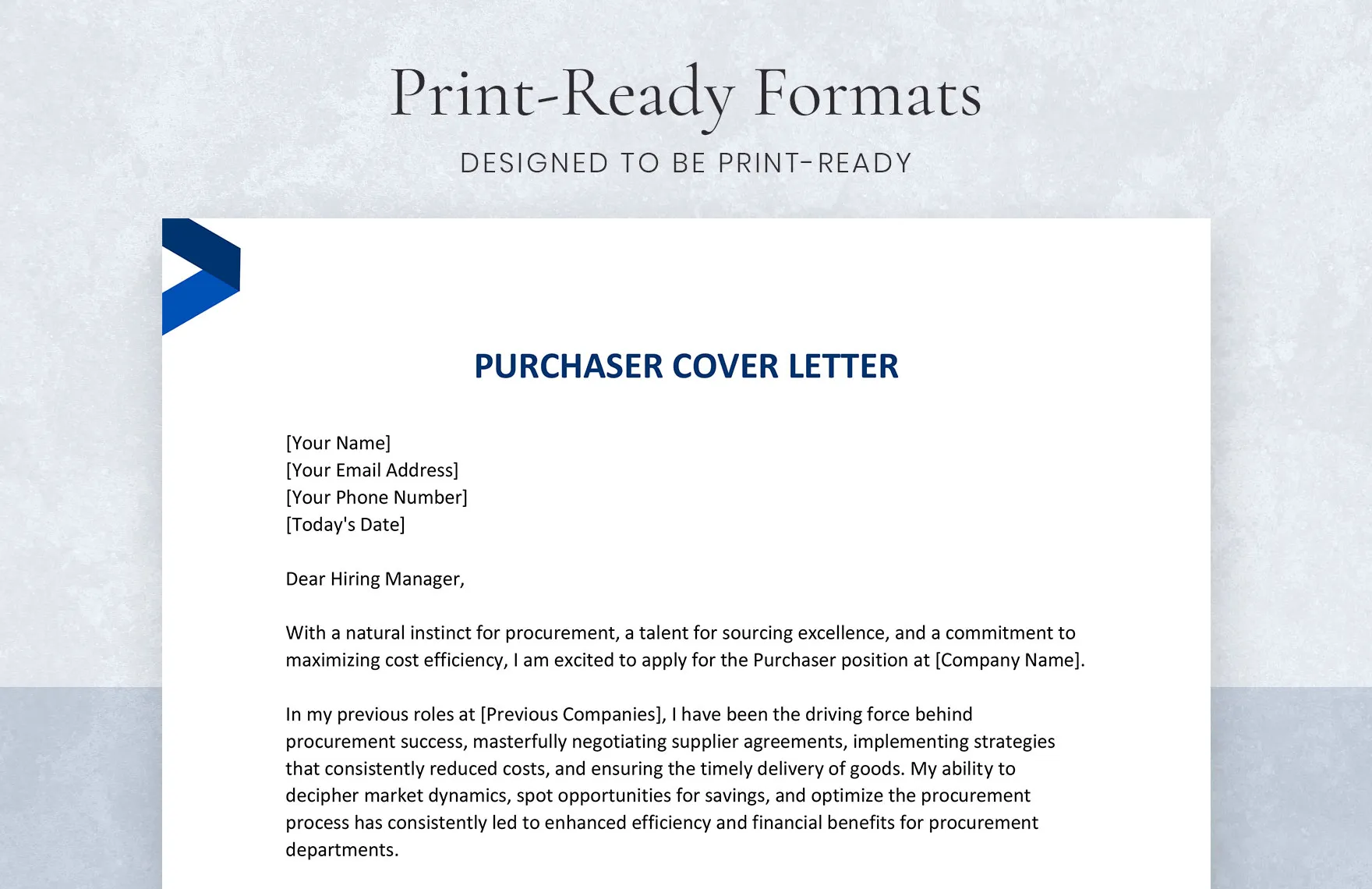What is a Cover Letter for Purchaser
A cover letter for a purchaser is a crucial document accompanying your resume when applying for a purchasing position. It serves as your personal introduction, providing a concise overview of your qualifications, skills, and experience, while also expressing your interest in the specific role and company. It’s your opportunity to make a strong first impression and showcase why you are the ideal candidate for the job. Unlike a resume, which is a factual account of your professional history, a cover letter allows you to elaborate on your achievements, explain your career goals, and demonstrate your personality and communication skills. A well-crafted cover letter can significantly increase your chances of getting an interview by highlighting your suitability and enthusiasm for the position.
The Importance of a Cover Letter for Purchaser
A cover letter is more than just a formality; it’s a vital tool in your job application process, especially for roles in purchasing. It allows you to connect with the hiring manager on a more personal level and provides context to your resume. By explaining your career aspirations and how they align with the company’s goals, you show that you’ve done your research and are genuinely interested in the opportunity. It helps you differentiate yourself from other applicants, as a personalized cover letter demonstrates initiative and attention to detail, both crucial qualities for a purchaser. The letter can also address any potential gaps or weaknesses in your resume, offering explanations or emphasizing transferable skills, giving you a competitive edge in a crowded job market. In essence, a strong cover letter is your chance to advocate for yourself and secure an interview.
Key Components of a Purchaser Cover Letter
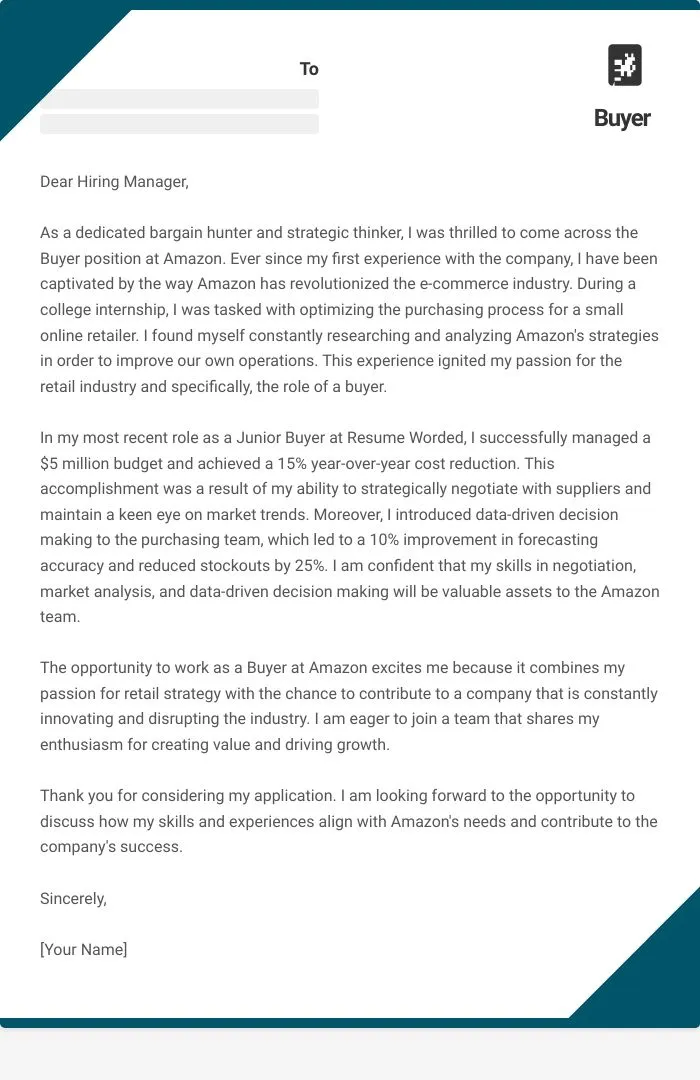
A compelling cover letter for a purchaser should contain several key components to effectively convey your qualifications and interest. Each part plays a critical role in presenting you as a well-suited candidate for the position. Start by making sure your contact information is correct.
Contact Information
At the very top of your cover letter, include your full name, address, phone number, and professional email address. This information should be clearly displayed to ensure the hiring manager can easily reach you. Double-check all details to avoid errors and ensure your contact information is current. Consider using a professional-looking email address, preferably one that includes your name. This not only provides essential contact details but also sets a professional tone from the beginning.
Professional Greeting
Address your cover letter to the hiring manager by name if possible. Research the company’s website or LinkedIn to find out the name of the hiring manager or the person in charge of purchasing. If you can’t find a specific name, use a professional greeting like ‘Dear Hiring Manager’ or ‘Dear [Company Name] Hiring Team.’ Avoid generic greetings like ‘To Whom It May Concern’ as they lack personalization. A personalized greeting demonstrates that you have taken the time to research the company and role.
Highlighting Relevant Skills and Experience
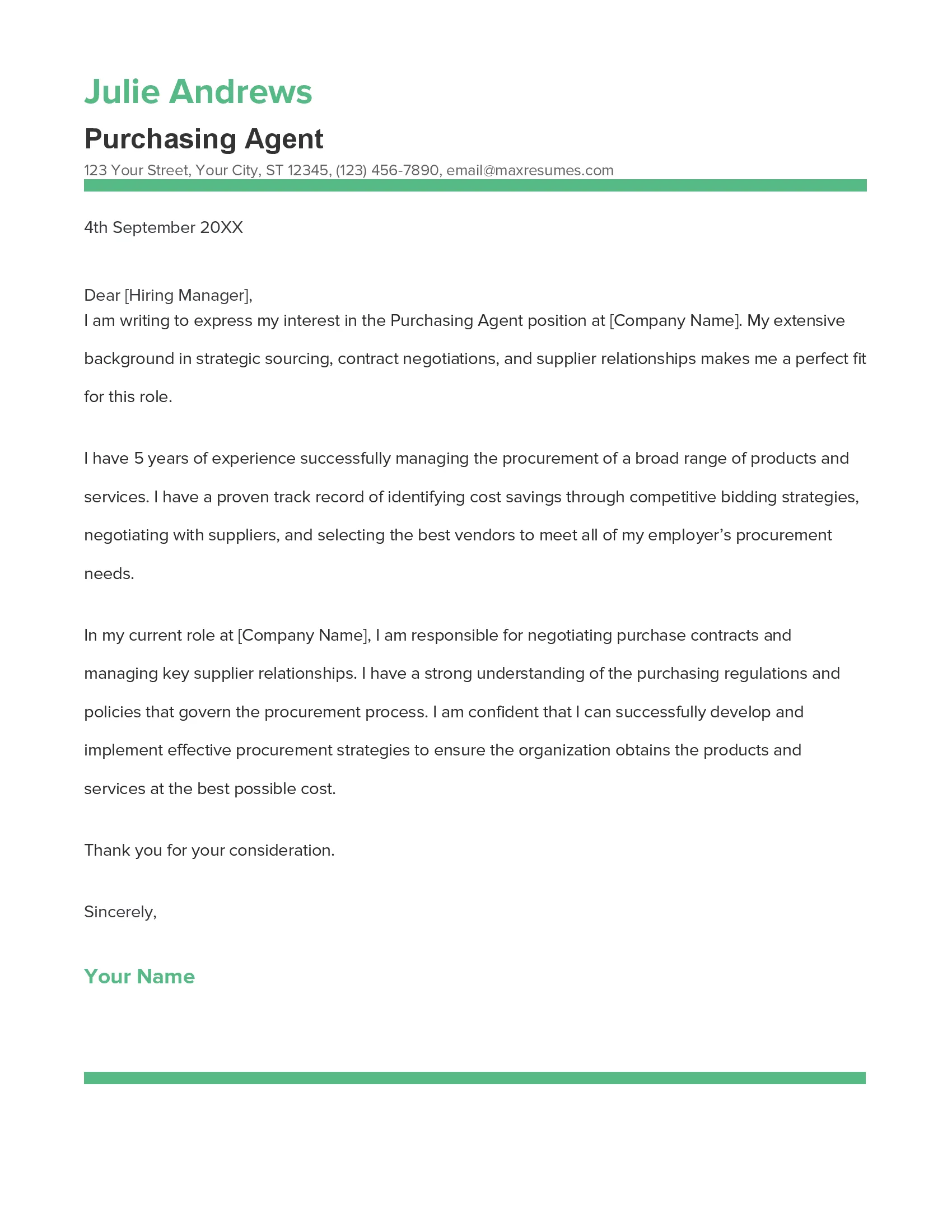
The main body of your cover letter should showcase your relevant skills and experience. Focus on the skills and experiences that directly align with the job description. Mention specific achievements from previous roles that demonstrate your capabilities in purchasing, such as negotiating contracts, managing vendor relationships, and cost reduction strategies. Use the job description as a guide to identify the key requirements and tailor your letter accordingly. Provide concrete examples of your accomplishments, and always try to quantify your results whenever possible to make your achievements more impactful and memorable.
Quantifying Achievements
Quantifying your achievements is essential to demonstrate your impact in previous roles. Instead of simply stating that you improved efficiency, provide specific numbers. For example, mention that you ‘reduced purchasing costs by 15% within one year’ or ’negotiated contracts that saved the company $50,000 annually.’ Use metrics like percentage improvements, dollar amounts saved, or units of items managed to showcase the tangible results of your work. Quantifiable achievements make your accomplishments more credible and help the hiring manager quickly understand the value you can bring to their organization. This approach makes your cover letter much more persuasive.
Expressing Enthusiasm and Interest
Conclude your cover letter by expressing your enthusiasm for the position and the company. Explain why you are excited about the opportunity and what attracts you to the role and the organization. Mention how your skills and experience align with the company’s needs and goals. Reiterate your interest in an interview and your availability. A strong closing reinforces your interest, leaves a positive impression, and encourages the hiring manager to move forward with your application. It is a chance to leave a memorable final statement.
Formatting Your Purchaser Cover Letter
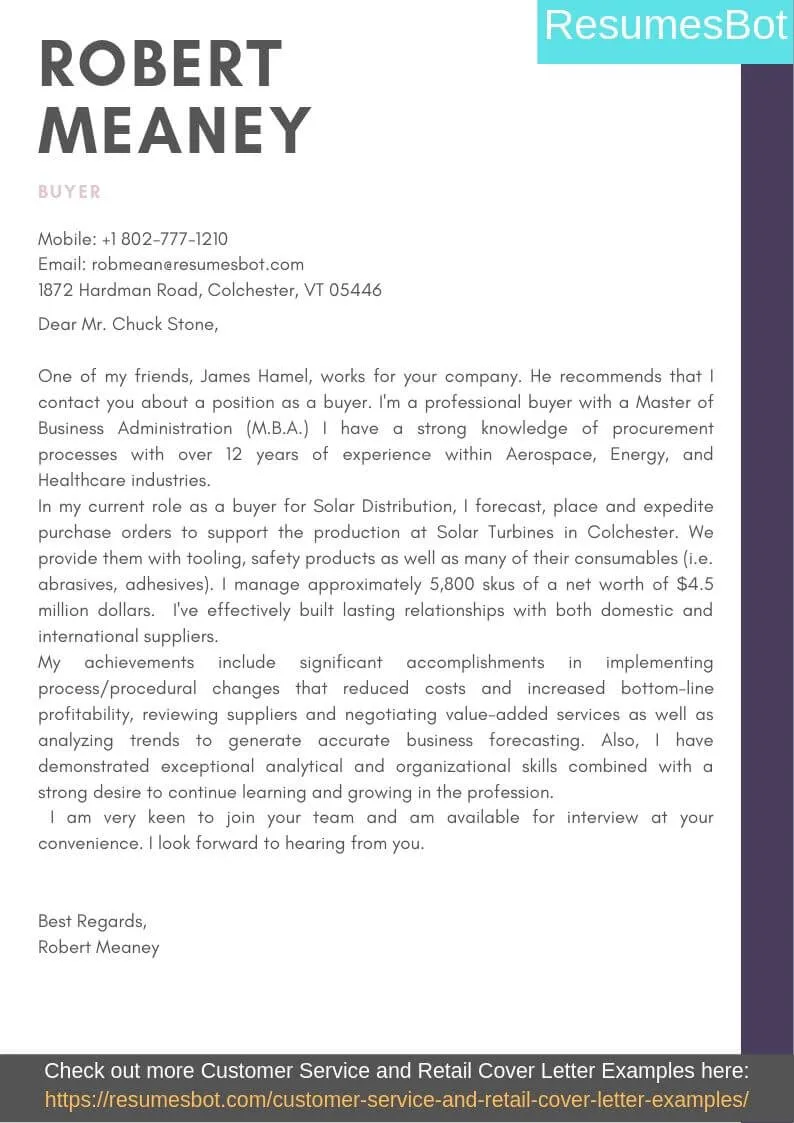
The formatting of your cover letter is just as important as the content. Proper formatting ensures your letter is easy to read and visually appealing. Using a clean, professional font like Arial, Calibri, or Times New Roman is essential, and maintain a consistent font size (11 or 12 points) throughout the document. The letter should be single-spaced, with one-inch margins on all sides. Use concise paragraphs, with each section focusing on a specific point to maintain reader engagement. Break up long blocks of text with bullet points or numbered lists when highlighting skills or achievements. Ensure a professional and organized layout reflects your attention to detail.
Choosing the Right Tone and Language
The tone and language you use in your cover letter significantly influence how you are perceived. Adopt a professional yet approachable tone. Use clear and concise language, avoiding jargon or overly complex sentences that could confuse the reader. Maintain a positive and enthusiastic tone, highlighting your interest in the position and the company. Tailor the language to match the company’s culture and the specific requirements of the role. Proofread carefully to eliminate any grammatical errors or typos. A well-written, error-free cover letter reflects your professionalism and attention to detail.
Proofreading and Editing
Proofreading and editing your cover letter are critical steps. Ensure your cover letter is free of grammatical errors, spelling mistakes, and typos. These errors can undermine your credibility. Read your letter multiple times, preferably aloud, to catch any mistakes. Use a spell checker and grammar checker as tools, but don’t rely on them entirely. Have someone else review your cover letter to provide a fresh perspective and catch any errors you may have missed. A polished, error-free cover letter shows that you are detail-oriented and professional.
Tips for Making Your Cover Letter Stand Out
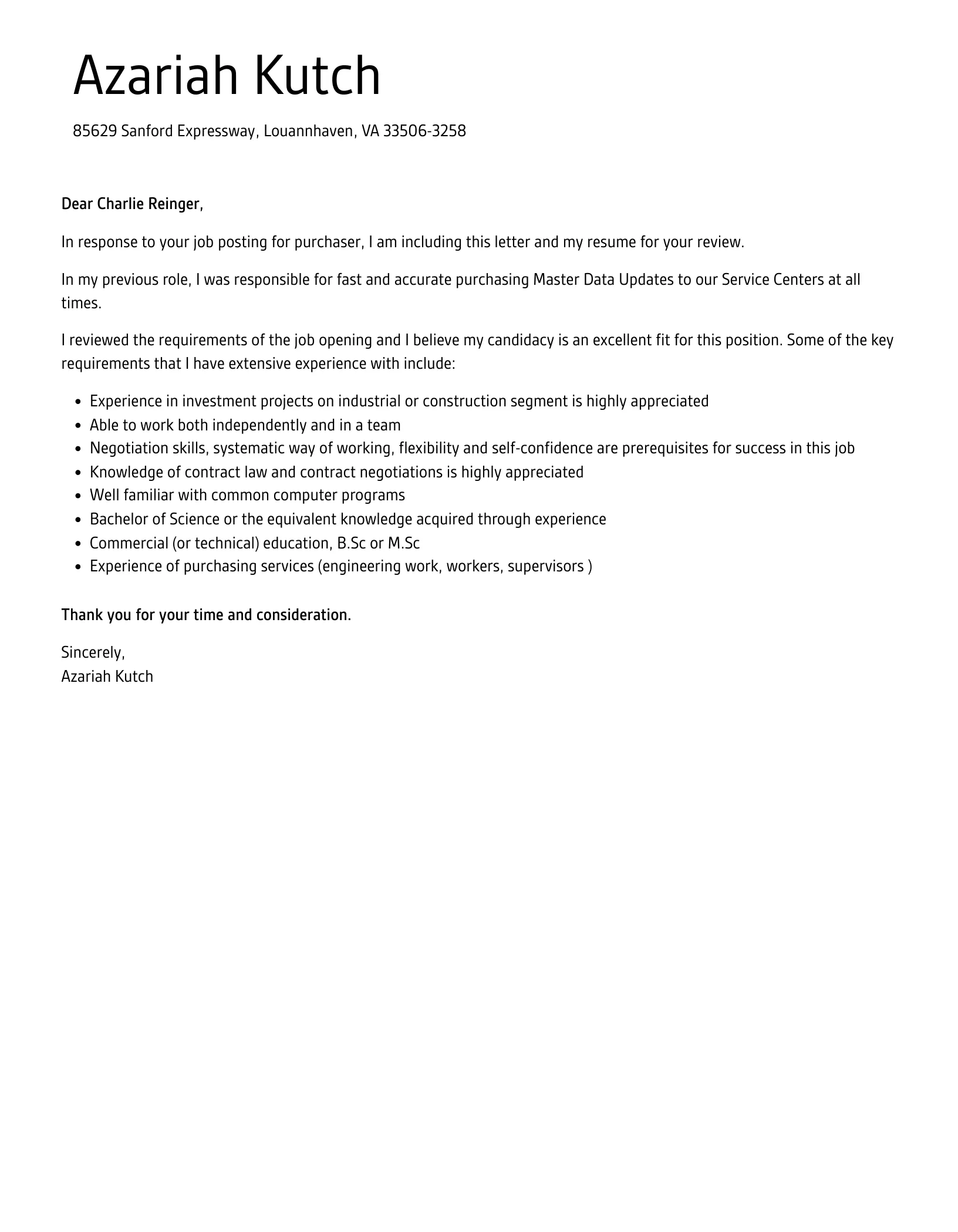
To make your cover letter stand out, consider several strategies. Personalize your letter to the specific company and role. Highlight your unique skills and experiences that align with the job description, and show how you can contribute to the company’s success. Demonstrate your knowledge of the company and the industry. Add a personal touch by mentioning something you admire about the company’s values or initiatives. Keep your letter concise and to the point. Focus on the most important aspects of your qualifications and achievements. A well-crafted and distinctive cover letter will capture the hiring manager’s attention and increase your chances of securing an interview.
Tailoring Your Cover Letter
Tailoring your cover letter to each job application is essential. Avoid using a generic template. Instead, carefully review the job description and tailor your letter to match the specific requirements and keywords. Highlight the skills and experiences that are most relevant to the position. Research the company to understand its values and culture. Customize your letter to address the company’s specific needs and goals. By tailoring your cover letter, you demonstrate your genuine interest and make it clear that you have the qualifications the employer is seeking. This personalization significantly improves your chances of getting noticed.
Using Action Verbs
Using strong action verbs is crucial to make your cover letter more impactful. Begin sentences with action verbs to describe your accomplishments and responsibilities. Examples of effective action verbs for a purchaser include ’negotiated,’ ‘managed,’ ‘reduced,’ ‘implemented,’ ‘sourced,’ ‘analyzed,’ and ‘optimized.’ This will make your descriptions more dynamic and compelling. Action verbs grab the reader’s attention and make your achievements more memorable. Using action verbs in your cover letter showcases your accomplishments and increases the impact of your application.
Examples of Effective Cover Letter Phrases
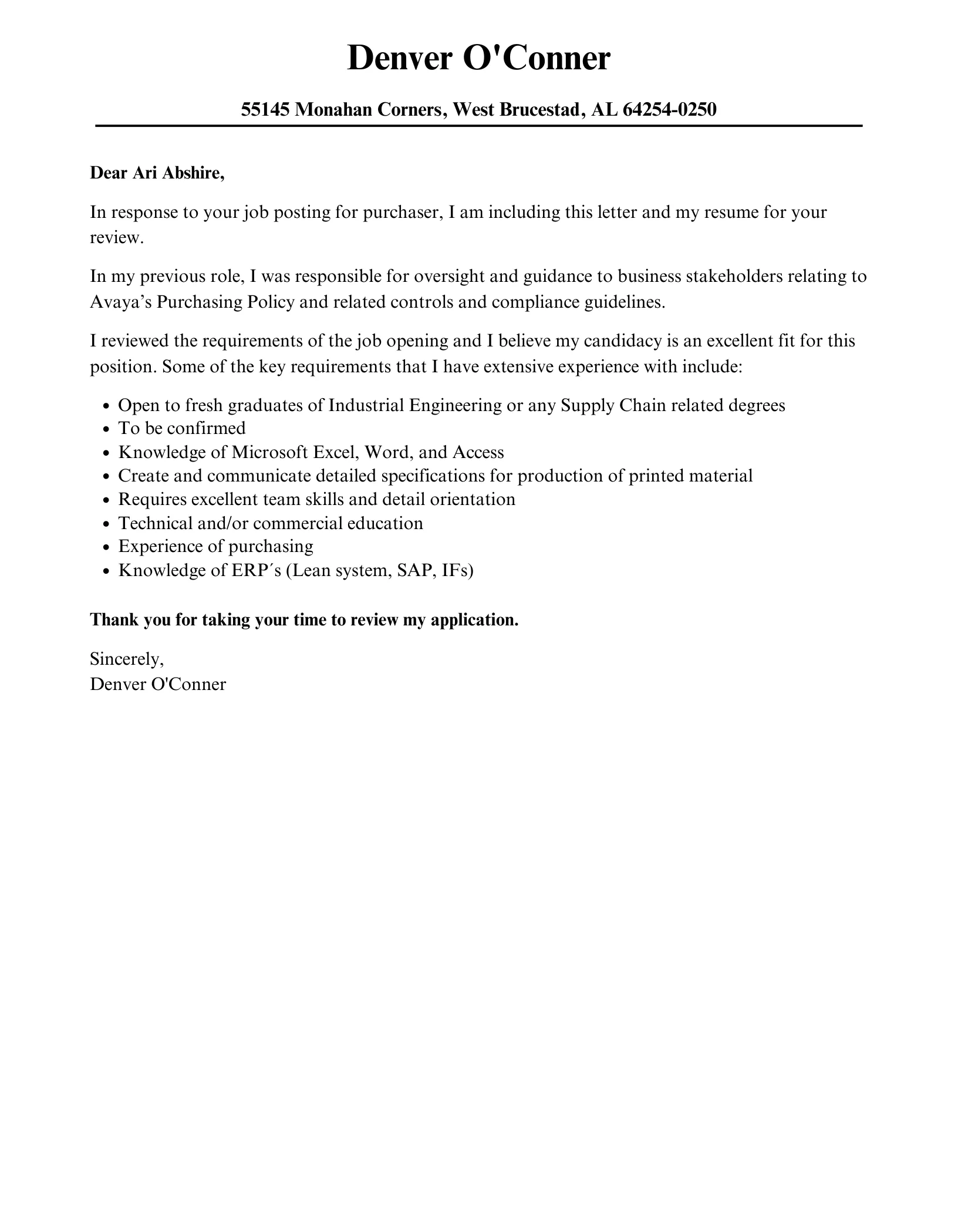
Incorporating effective phrases can greatly enhance your cover letter. Here are some examples tailored for a purchaser role, such as: ‘Negotiated contracts resulting in a 10% cost reduction,’ ‘Managed a budget of $X, consistently meeting or exceeding targets,’ ‘Implemented a new vendor selection process, improving efficiency by 15%,’ ‘Sourced and secured new suppliers,’ and ‘Analyzed market trends to identify cost-saving opportunities.’ Using these types of phrases clearly demonstrates your expertise and achievements. Tailor these to your own experience to make them more relevant and powerful.
Common Mistakes to Avoid in a Purchaser Cover Letter
Several common mistakes can undermine the effectiveness of your cover letter. Avoid these pitfalls to make your application stronger. Not proofreading is a major mistake. Generic language and failing to highlight relevant skills are also key areas to avoid. Be careful to make sure your letter is free of errors.
Not Proofreading Your Cover Letter
Failing to proofread your cover letter is a critical mistake. Grammatical errors, spelling mistakes, and typos can create a negative impression and detract from your qualifications. Always proofread your letter multiple times, preferably with a fresh perspective each time. Use spell checkers and grammar checkers as tools. Have another person review your letter to catch errors you might have missed. A well-proofread cover letter demonstrates your attention to detail and professionalism.
Using Generic Language
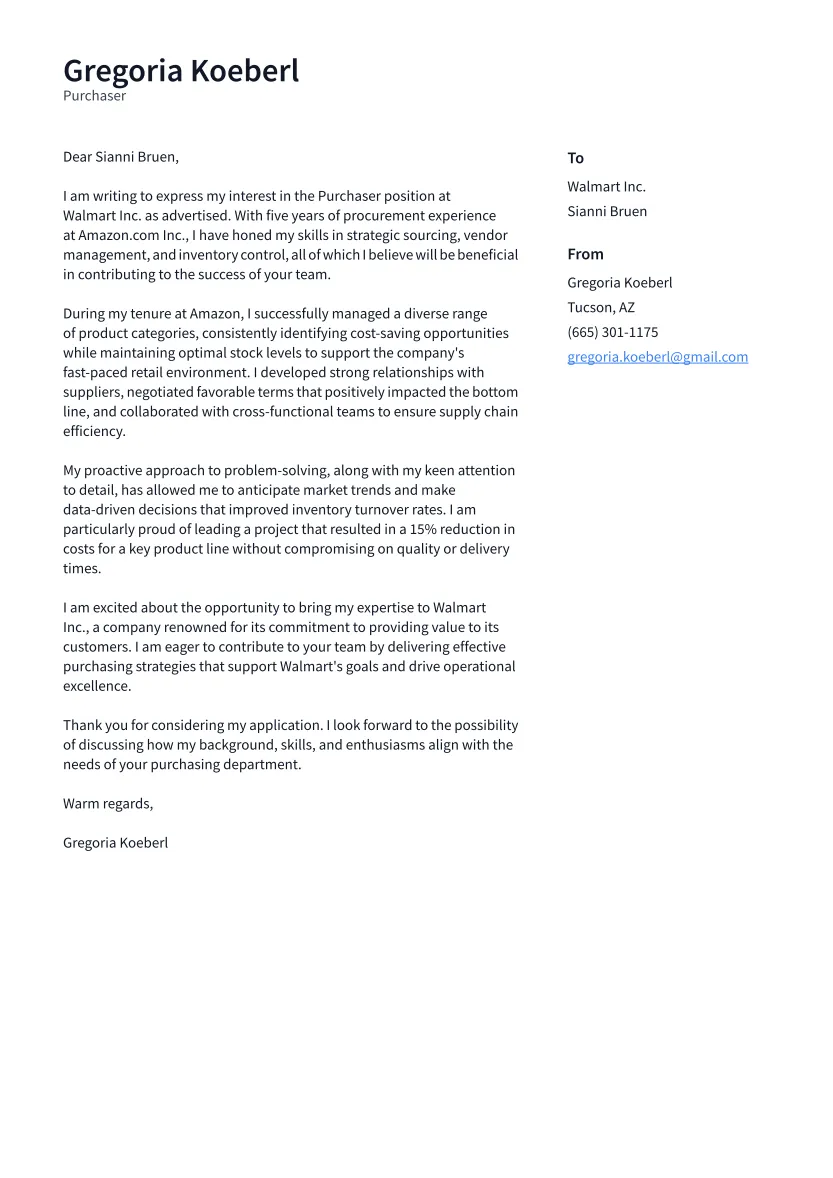
Using generic language makes your cover letter less impactful. Avoid using clichés and phrases that lack specificity. Instead, be specific about your skills, experiences, and accomplishments. Tailor your language to match the job description and highlight what makes you unique. Provide concrete examples to back up your claims. Generic language will make your cover letter sound unoriginal. A personalized cover letter with specific details will resonate more with the hiring manager.
Failing to Highlight Relevant Skills
Failing to highlight relevant skills means you are missing a significant opportunity. Carefully review the job description and identify the key skills and experiences the employer is seeking. Make sure these are clearly highlighted in your cover letter. Use specific examples from your previous roles to demonstrate how you have utilized these skills. Match the keywords and phrases used in the job description as well. This approach makes it easier for the hiring manager to see that you are a good fit. By focusing on the skills and experiences that matter most, you increase your chances of getting noticed.
Tools and Resources for Writing a Purchaser Cover Letter
Several tools and resources can help you write a compelling cover letter. From templates to online builders, using these resources can help streamline the writing process and improve the quality of your application. They can also provide useful suggestions and examples to help you get started.
Cover Letter Templates
Cover letter templates provide a structured format for your letter. These templates typically include sections for contact information, a professional greeting, a summary of your qualifications, your key skills and experiences, and a closing. Online templates, available on websites like Microsoft Word or Google Docs, offer various designs and layouts to help you create a professional-looking document. You can customize these templates to fit your specific needs. Using a template can save you time and ensure your cover letter follows a standard and effective format.
Online Cover Letter Builders
Online cover letter builders are interactive tools that guide you through the process of writing a cover letter. These tools typically ask you questions about your experience and skills and then generate a cover letter based on your answers. They can offer suggestions for wording and formatting and provide you with a completed document. Some builders offer templates tailored to specific industries or job roles. These builders are helpful if you are new to writing cover letters or need assistance with the language and structure. They make it easy to create a polished and professional cover letter.
Conclusion
Writing a great cover letter for a purchaser role is a strategic process that can significantly impact your job search success. By focusing on key components, such as highlighting relevant skills, quantifying achievements, and expressing your enthusiasm, you can create a compelling cover letter that captures the hiring manager’s attention. Tailoring your letter to each job application, using strong action verbs, and avoiding common mistakes are essential. Remember to proofread carefully and take advantage of the available tools and resources. With a well-crafted cover letter, you can effectively present yourself as a strong candidate, increasing your chances of landing an interview and securing your desired purchasing position. Good luck with your job search!
